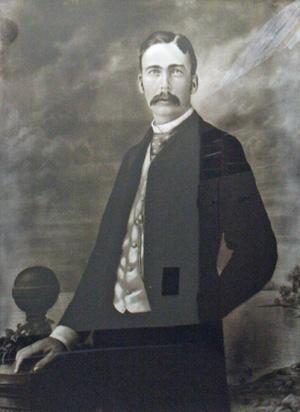By Barb Arland-Fye

Browsing through newspaper archives in preparation for our Catholic Messenger subscription drive, I became immersed in the story of our diocesan newspaper and its development over the past 130 years.
In our previous office I could feel the presence of Tom Sharon, the newspaper’s founder, because of the enormous portrait hanging on an office wall. Since we’ve moved, we haven’t found the best spot for the portrait from which Tom can observe our staff in action.
The 27-year-old Irish Catholic publisher had come to Davenport after serving as publisher of the La Porte City (Iowa) Review for two years. Prior to that, he’d been a New York high school instructor. He founded the Iowa Messenger — the first English language Catholic newspaper in Iowa — in November 1882, just one year after the Diocese of Davenport was established. Early Catholic newspapers were almost entirely owned and operated by lay men and women, according to historical records.
In the first issue, printed Jan. 1, 1883, Sharon informed readers that the weekly newspaper would be “devoted to the interests of the Catholic Church, the state of Iowa and the cities of Rock Island, Davenport and Moline. It will contain all the news of the week — home and foreign — from a Catholic standpoint that is, greater prominence will be given to events of interest to members of that church.”
Having read portions of some of the early issues, I knew Sharon was deeply committed to serving Irish Americans, which the “History of The Catholic Messenger” (1948) confirms. “He wanted the paper to give news of interest to Catholics; to spread knowledge of Catholic doctrine; to break down bigotry toward the Church, and to fight for the betterment of the Irish race.”
In a broad sense, those goals continue at The Catholic Messenger — although we’d substitute betterment of the Irish race with immigration reform.
Sharon’s brothers, Emmett and Fred, and his sister, Minnie, assisted him in the newspaper’s operation. When Tom Sharon died at age 33 in 1888, Fred assumed the publisher’s post and held that position until 1936. Minnie Sharon served as city editor and Emmett, as a prolific contributor.
In 1889, the Iowa Messenger changed its name to the Iowa Catholic Messenger “to distinguish it from a two-bit issue of some woman’s society in Des

Moines,” the history says. In 1902 the Messenger absorbed the Northwestern Catholic of Sioux City and the paper’s name changed to The Iowa Catholic Messenger/and Northwestern Catholic. Another name change, to The Catholic Messenger, occurred in 1905 and again in 1923 when it became The Catholic Messenger and Western World. Circulation dropped between the mid- 1920s-1930s.
In 1936, Fred Sharon sold the newspaper to 14 Catholic businessmen in Davenport for $10,000. They renamed the paper The Catholic Messenger on Dec. 17, 1936. Circulation climbed, but two years later, on Jan. 3, 1938, the businessmen sold The Catholic Messenger to the Diocese of Davenport.
Circulation skyrocketed under diocesan ownership, which conducted an intensive subscription drive. The newspaper’s motto was “A Catholic Paper in Every Catholic Home.” At the end of June 1938, circulation had reached 15,725 — an increase of 9,000 subscriptions over the previous year!
The Catholic Messenger’s 55th anniversary edition provides a fascinating look at the world of Feb. 3, 1938, from the Catholic perspective. The banner headline reads: “War on Evil Publications Spreads.” The accompanying article spoke of Catholic Press concern about “the veritable flood of obscene publications that is inundating the country,” although the “obscene publications” were not identified. Today we’re concerned with obscenity on videos, TV and the Internet.
Several other articles on the front page of the 1938 anniversary edition focused on social justice issues. In one, Archbishop Francis J.L. Beckman of Dubuque was quoted calling for just wages for workers. “The living and family wage insisted on incessantly and stressed uncompromisingly in the social teaching of the Popes is by no means observed generally in Dubuque,” the archbishop said.
We’re still grappling with labor issues today. In April 2011 our Bishop Martin Amos and the Des Moines Diocese’s Bishop Richard Pates signed a statement regarding labor unions and government negotiations. The statement concluded: “The present moment offers an opportunity for unions and management to work strenuously for the common good in order that all in society might participate justly and equitably in the rich gifts of a beneficent creator.”
While it’s fascinating to see how some issues have resurfaced in the course of 130 years, clearly the world has undergone transformation from generation to generation. What remains constant at The Catholic Messenger is a commitment to inspire readers to respond to the Gospel message of Jesus Christ in ways that meet the needs of the times.








